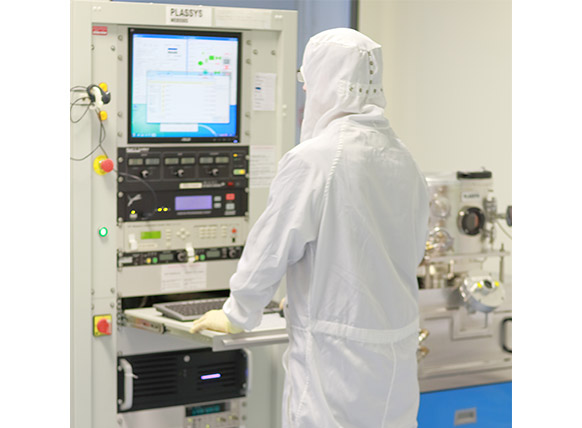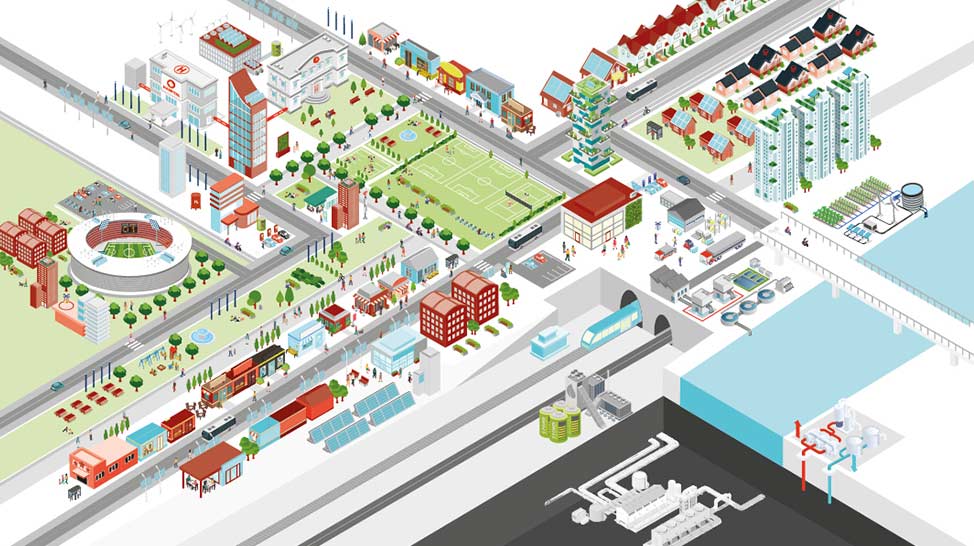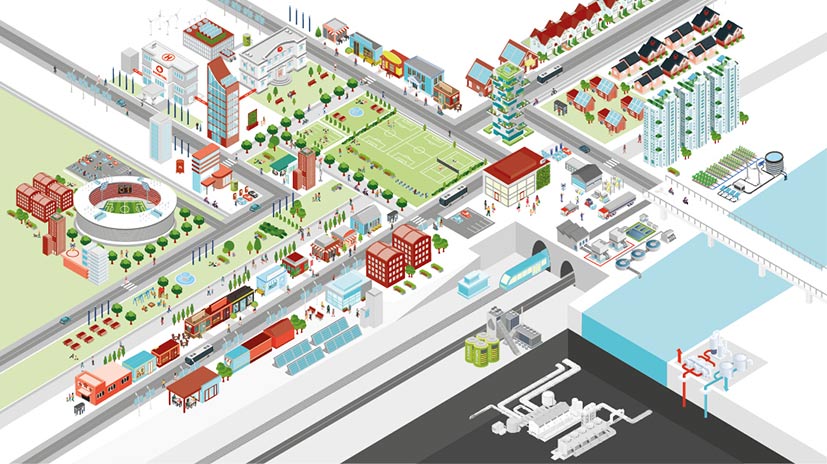Industry 4.0. The path to a green business future
Steam, mass production, digital technology: the three seismic shifts that have revolutionised industry and changed society. So what’s next? The fourth industrial revolution, or Industry 4.0 is smart.




Industrial Revolutions are the seismic shifts in technology which prompt an equally sweeping shift in the way people do business and the way the business world functions1.
Scholars would tell you that the world has already experienced three so far: the advent of the steam engine, the implementation of mass production and science, and the boom in digital and cloud technology.
Roughly 50 years on from the last, which followed the rise of programmable chips and computers, Industry 4.0 – also known as the 4th Industrial Revolution – is now upon us.


Think of it as the age of smart technology: a world in which supply chains, manufacturing systems and business operations are increasingly powered by the Internet of Things and capable of both communicating and analysing information.
In effect, by fusing traditional business resources with new technologies such as artificial intelligence (AI) and automation, industry 4.0 processes aren't just enabling more forms of equipment to speak to one another – they are smart enough to use that data to automatically make real-world decisions.
Thanks to their growing ability to optimise energy use, enhance waste management processes and provide expanded access to renewable resources, they're also increasingly helping to power a greener and more sustainable approach to business.
To put things in perspective: by 2025, market researchers IDC predict that more than 55.7 billion devices will be connected and talking to one another2 and generating a staggering 80 zettabytes of data (one zettabyte is approximately equal to a thousand exabytes, a billion terabytes, or a trillion gigabytes).
Under an Industry 4.0 operating model, all sorts of these systems will suddenly be capable of sharing info amongst each other and using this data to make intelligent choices.
Industry 4.0 solutions are already doing far more than simply helping companies discover new ways to become more carbon neutral, green their operating or transportation models and shift to eco-friendlier or more recyclable materials and solutions. They're also increasingly helping business leaders to identify strategies allowing them to adopt lower-impact approaches to global industrialisation, implementing more energy-efficient buildings and facilities, and leveraging more affordable and clean energy solutions.


Smart cities, smarter tech
As a simple illustration of this concept, smart and advanced meters are already helping power networks of artificially-intelligent energy grids here in the UK, which can adjust supply based on usage patterns and predictions, rerouting power as needed.
A host of growingly smart cities are leveraging industry 4.0 principles to deploy smarter waste bins, water meters and city-wide lighting systems that can self-manage.
But in the future, you won't just see office buildings capable of dimming lights and adjusting heating and cooling to match workers' schedules, or that are growingly capable of tapping into solar, wind, and water-powered energy sources as needed and as available.
You'll also see entire businesses using Industry 4.0-powered solutions to make positive changes at worldwide scale. In just one striking example of Industry 4.0's potential impact, hundreds of firms throughout Europe are already thinking about how to radically re-imagine transport logistics and reduce day-to-day consumption by utilising fleets of self-driving electric vehicles and warehouses full of artificially intelligent drones.
According to researchers from Hungary to South Africa, it's no surprise that every sector of business is now seeking to adopt Industry 4.0 principles. Moreover, these principles have changed the way business and production are now conducted in their entirety3.
From offices to industry
Imagine entire industrial buildings designed using virtual reality 3D modelling and data analytics software to be optimised for energy-efficiency. Now picture these structures being constructed with materials incorporating eco-friendly self-healing bacteria4 that can self-repair any damage. Mind you, that's before you factor in the presence of IoT sensors capable of tracking if workers are on-site or gone for the evening and telling environmental control systems to shut off the lights and air conditioning – then analysing data to spot patterns and do so more efficiently with each passing day.
This isn't the stuff of science fiction either: all of these solutions are already possible today thanks to Industry 4.0 solutions.
Manufacturing is yet another area where Industry 4.0 capabilities are rewriting the rules of engagement. See the rise of smart factories staffed by robots that leverage the power of machine learning to computerise assembly lines or self-diagnose in the event of equipment failure.
Alternately, facilities equipped with intelligent filtration sensors that, on detecting a rise in pollutants or chemicals, can automatically take steps to mitigate environmental concerns and protect workers.


Streets of the Future – a view of how our cleaner, greener cities could look
We’ve worked with the UK Green Building Council to explore how the streets of the UK could look in a future world designed to tackle climate change – absorbing the new technologies and lifestyle changes in our buildings, road traffic, energy generation and even recreation.
Visit eonenergy.com/streets-of-the-future for more information.
Here lies the beauty of the Industry 4.0 framework: not only does it layer digital insight and impact on top of physical solutions, making it possible for organisations to fuel business growth while simultaneously boosting their sustainability, it also transforms every device and interaction into a possible source of learning and insight as well.
At a base level, Industry 4.0 describes a system of networked devices over which data tracking and analytics capabilities have been layered – and which are continuously generating and responding to new information.
These systems are backed by artificial intelligence software which helps extract key insights and make informed decisions and machine learning helps devices and applications get smarter over time.
Employed in tandem, all can help business boost productivity and deliver more sustainable outcomes over time. It's no surprise that a skyrocketing number of firms have begun to favour these tools, or that another Industrial Revolution is clearly upon us – one that promises to see tomorrow’s companies operating far more eco-consciously, far more energy-efficiently, and with far less waste and greenhouse gas emissions.
1. Britannica: Industrial Revolution
2. IDC: Future of Industry Ecosystems: Shared Data and Insights
3. MDPI: Impact of Industry 4.0 on Environmental Sustainability
4. The Guardian: The self-healing concrete that can fix its own cracks
Share to:


Sustainable homes
Find out the many ways in which you can create a more sustainable home and reduce your carbon footprint.


Sustainable cities and communities
Find out how we're creating smart, sustainable cities and communities across the world.


Sustainable businesses
Find out how to turn your business into an industry leader for sustainability.


Going greener
Whether you’re driven by environmental and social concerns, or responding to customer demand, we take a look at the opportunities offered by renewable and sustainable business solutions.


100% renewable electricity
We believe in a sustainable future, that's why we provide our customers' homes with electricity backed by 100% renewable sources including wind, biomass and solar, with a fixed tariff.


The advantages and disadvantages of solar energy
Solar energy can power our homes, businesses and communities. Discover the pros and cons of solar power and how it works to generate renewable energy.